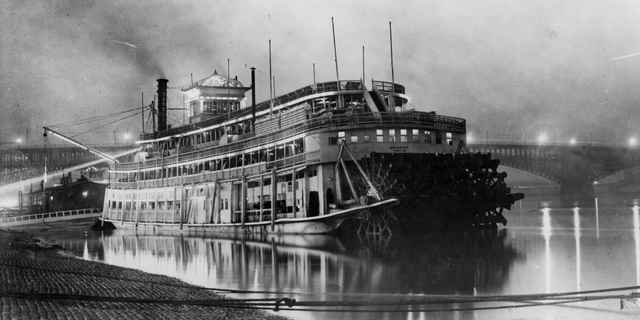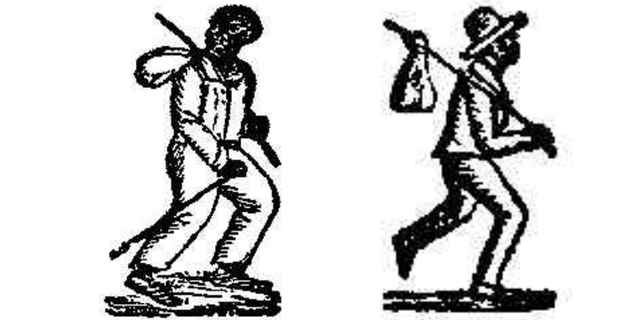This is an excerpt from a chapter in The Underground Railroad by William Still. It concerns the fate of two men who fled from slavery to Liverpool, England, with the help of sympathetic English sailors.
The title is “Two Passengers On The Underground Railroad Via Liverpool”. The excerpt records the testimony of Joseph Grant.
Excerpt
The original names of these adventurers were Joseph Grant and John Speaks.
Between two and three years before escaping, they were sold from Maryland to John B. Campbell a negro trader, living in Baltimore, and thence to Campbell’s brother, another trader in New Orleans, and subsequently to Daniel McBeans and Mr. Henry, of Harrison county, Mississippi.
Though both had to pass through nearly the same trial, and belonged to the same masters, this recital must be confined chiefly to the incidents in the career of Joseph.
He was about twenty-seven years of age, well made, quite black, intelligent and self-possessed in his manner.
He was owned in Maryland by Mrs. Mary Gibson, who resided at St. Michael’s on the Eastern Shore. She was a nice woman he said, but her property was under mortgage and had to be sold, and he was in danger of sharing the same fate.
Joseph was a married man, and spoke tenderly of his wife.
She “promised” him when he was sold that she would “never marry,” and earnestly entreated him, if he “ever met with the luck, to come and see her.”
She was unaware perhaps at that time of the great distance that was to divide them; his feelings on being thus sundered need not be stated.
However, he had scarcely been in Mississippi three weeks, ere his desire to return to his wife, and the place of his nativity constrained him to attempt to return; accordingly he set off, crossing a lake eighty miles wide in a small boat, he reached Kent Island.
There he was captured by the watchman on the Island, who with pistols, dirk and cutlass in hand, threatened if he resisted that death would be his instant doom. Of course he was returned to his master.
He remained there a few months, but could content himself no longer to endure the ills of his condition.
So, he again started for home, walked to Mobile, and thence he succeeded in stowing himself away in a steamboat and was thus conveyed to Montgomery, a distance of five hundred and fifty miles through solid slave territory.

Again, he was captured and returned to his owners; one of whom always went for immediate punishment, the other being mild thought persuasion the better plan in such cases.
On the whole, Joseph thus far had been pretty fortunate, considering the magnitude of his offence.
A third time he summoned courage and steered his course homewards towards Maryland, but as in the preceding attempts, he was again unsuccessful.
In this instance Mr. Henry, the harsh owner, was exasperated, and the mild one’s patience so exhausted that they concluded that nothing short of stern measures would cause Joe to reform.
Said Mr. Henry;
“I had rather lose my right arm than for him to get off without being punished, after having put us to so much trouble.”
Joseph will now speak for himself.
“He (master) sent the overseer to tie me. I told him I would not be tied. I ran and stayed away four days, which made Mr. Henry very anxious.
Mr. Beans told the servants if they saw me, to tell me to come back and I should not be hurt. Thinking that Mr. Beans had always stood to his word, I was over persuaded and came back.
He sent for me in his parlor, talked the matter over, sent me to the steamboat (perhaps the one he tried to escape on.)
After getting cleverly on board the captain told me, I am sorry to tell you, you have to be tied. I was tied and Mr. Henry was sent for.
He came; ‘Well, I have got you at last, beg my pardon and promise you will never run away again and I will not be so hard on you.’
I could not do it. He then gave me three hundred lashes well laid on. I was stripped entirely naked, and my flesh was as raw as a piece of beef.
He made John (the companion who escaped with him) hold one of my feet which I broke loose while being whipped, and when done made him bathe me in salt and water.
“Then I resolved to ‘go or die’ in the attempt. Before starting, one week, I could not work.

On getting better we went to Ship Island; the sailors, who were Englishmen, were very sorry to hear of the treatment we had received, and counselled us how we might get free.”
The counsel was heeded, and in due time they found themselves in Liverpool.
There their stay was brief. Utterly destitute of money, education, and in a strange land, they very naturally turned their eyes again in the direction of their native land.
Accordingly their host, the keeper of a sailor’s boarding-house, shipped them to Philadelphia.
But to go back, Joseph saw many things in New Orleans and Mississippi of a nature too horrible to relate, among which were the following:
I have seen Mr. Beans whip one of his slaves to death, at the tree to which he was tied.
Mr. Henry would make them lie down across a log, stripped naked, and with every stroke would lay the flesh open. Being used to it, some would lie on the log without being tied.
In New Orleans, I have seen women stretched out just as naked as my hand, on boxes, and given one hundred and fifty lashes, four men holding them. I have helped hold them myself: when released they could hardly sit or walk. This whipping was at the “Fancy House.”
The “chain-gangs” he also saw in constant operation. Four and five slaves chained together and at work on the streets, cleaning, &c., was a common sight.
He could hardly tell Sunday from Monday in New Orleans, the slaves were kept so constantly going.
Source
The Underground Railroad by William Still was published in 1872.
The book is in the public domain. It can be found in the Library of Congress.